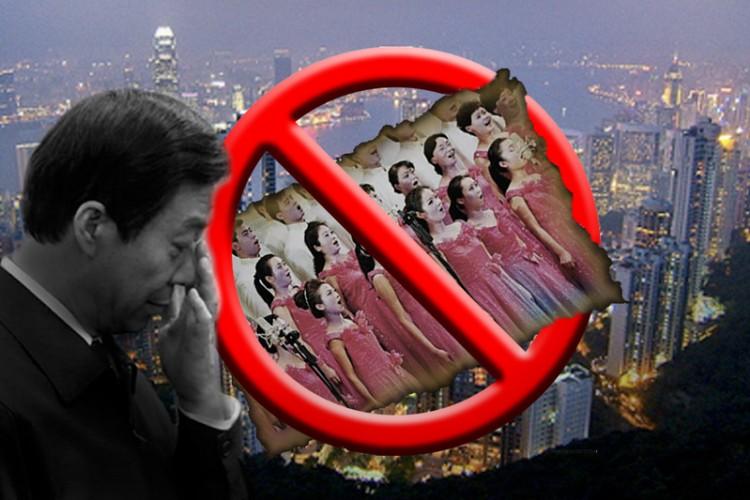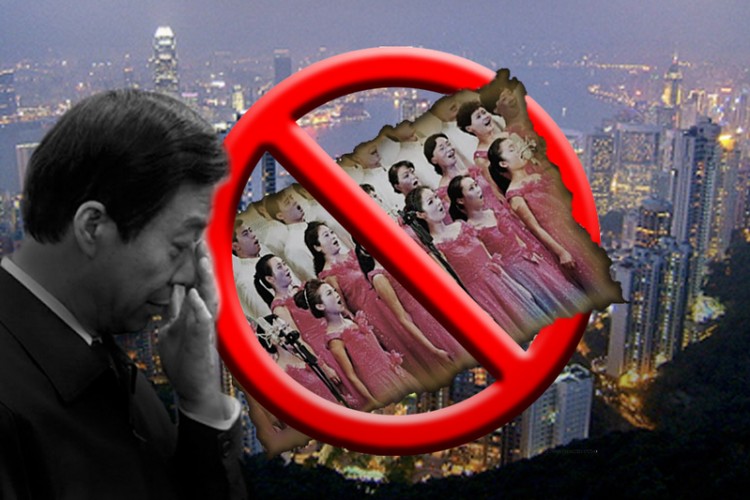A 500-member strong “Red Song” performance troupe from Chongqing City went on a three-day tour in Hong Kong. Coinciding with the Chinese Lantern Festival on Feb. 6, the purpose seems to have been to enthrall Hong Kong audiences with old communist revolutionary songs.
Chongqing has become a bastion of red song revivalism, and other ultra-leftist Cultural Revolution-style hard-hitting practices, after Bo Xilai became communist party head there.
Red song troupes have performed in Beijing, but for Hong Kong it’s a first, and according to Howard Lam, channel director of Hong Kong-based Green Radio, the communist regime’s effort to promote its party culture in Hong Kong would not be a lure, but a waste.
“It’s ridiculous to sing red songs in Hong Kong, and only shows that the communists in both Mainland China and Hong Kong have lost confidence in their rule,” Lam said.
Lam said he believed that many Hong Kong youths and people from academic circles were forced to attend the performance, but not many people have a lot of feelings for the songs.
“What’s the relationship between Hong Kong and the history behind the Red Army?” Lam asked. “The Red Army and red songs are nothing else but history of the communist party. That is an attempt of brainwashing, an attempt to change ideology. I don’t think it will succeed,” he said.
Brainwashing
The red song troupe performed at Hong Kong City Hall Concert Hall, the Jockey Club Auditorium at Hong Kong Polytechnic University (PolyU), and at the military camp on Stonecutters Island.
On PolyU campus, there were no advertising posters to be found anywhere, neither at the Jockey Club Auditorium. Most of the students interviewed around campus just prior to show time said they had not heard of the performance.
A female student with a ticket in her hand asked for directions to the performance. She said she was notified by a pro-communist group and told to attend.
Several PolyU students also said they thought the Red Song Troupe came with the intention of brainwashing Hong Kongers.
One student said: “I could feel their intention is to brainwash locals. Compared with Mainland China, Hong Kong is relatively free, and everyone can voice their political stance. I think the troupe is likely a brainwashing attempt, twisting art, or to serve as political propaganda.”
Another student said: “Better educated college students take their own stand and won’t be easily influenced if they were to listen to red songs; but there is still the possibility of brainwashing. If I were asked, I wouldn’t go.”
Another student said: “As a Hong Kong resident, I have been in contact with communism, and am aware of Western liberty and democracy. I embrace democracy, since I don’t want to have my thoughts and ideas controlled. I would rather enjoy personal freedom and do what I prefer.”
The Chinese regime’s projection of soft power, using culture, film, and media, often fail to impress the international community.
For example, the 2011 China Movie Culture Week, hosted by China’s Ministry of Culture, the State Administration of Radio Film and Television, and Columbia University, experienced an embarrassing flop. At the Oct. 17 premier at New York’s Lincoln Center no audience showed up for the movie “Founding of a Republic,” not even anyone from the hosting organizations.
“Founding of a Republic” is a patriotic propaganda piece glorifying the communist takeover of China and was financed by the CCP’s largest state owned film company.
Read the original Chinese article.






